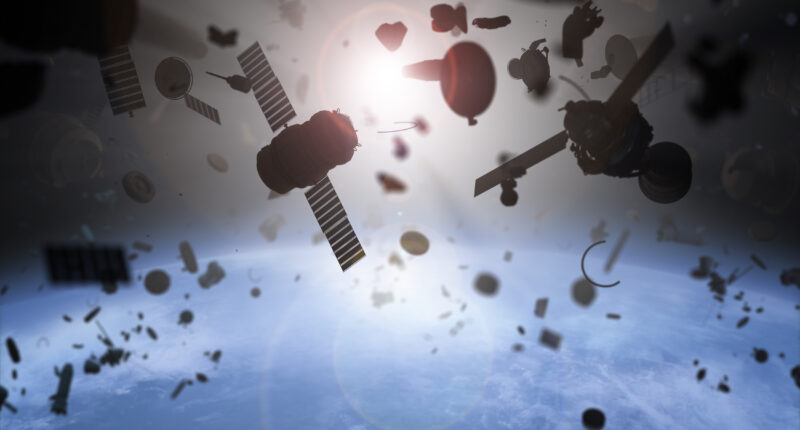EXPERTS have predicted the night sky will be overrun by satellites by the end of the decade, hindering astronomers’ abilities to observe the stars and potentially detect extraterrestrial life.
There has been a four-fold increase in the number of satellites orbiting the Earth, rising to over 8,000, with an additional 400,000 satellites having been approved for low Earth orbit.
SpaceX alone plans to launch 44,000 satellites for its Starlink internet constellation.
The bright light streaks created by satellites passing in front of telescopes have become a problem for astronomers. Internet satellites can also interfere with radio telescopes.
Already, scientists are recording unpredictable movements from satellites.
On January 27, a close call in Low Earth Orbit had the potential to generate a vast amount of hazardous space debris.
LeoLabs, a company specializing in satellite monitoring and collision detection, spotted a near miss between two inactive Soviet objects, a rocket body, and a defunct spy satellite.
The two objects missed colliding by a mere 20 feet, with a margin of error of only a few dozen meters.
LeoLabs said the incident was nearly a “worst-case scenario” that could have resulted in thousands of additional pieces of space debris in a chain reaction.
Fortunately, the two objects managed to avoid a collision.
Most read in News Tech
Tony Tyson, a professor of physics and astronomy at the University of California, said that the sky in 2030 would be “crawling with moving satellites” and the number of visible stars would be at a minimum according to The Independent.
The Royal Astronomical Society, the UK Space Agency, and the Department for Business are so concerned about this issue that they held a conference last week to discuss the need for regulation.
Robert Massey, deputy executive director of the RAS, stated that the world is experiencing a shift in the use of space and that the prospect of hundreds of thousands of satellites in orbit by the end of the decade is becoming a reality.
He warned that detecting signals from other civilizations will become increasingly difficult if the sky becomes too cluttered and noisy.
The Vera Rubin observatory in Chile is already facing major challenges from satellites as the Vera Rubin telescope begins its ten-year survey next year.
Early testing has shown that 40 percent of the telescope’s frames will be impacted during twilight hours.
Telescopes in space, such as Hubble, are also suffering from over-saturation as reflective satellites pass by.
Experts are not only concerned about the impact on astronomy but also about the potential for the night sky to be changed forever.
Ken MacLeod, a satellite expert, has calculated that when all internet constellations become operational, there will be around 16,000 decaying internet satellites at any given time.


MacLeod warned that these satellites will eventually fall out of orbit, causing “re-entry fireballs.”
With an estimated 60 falling satellites per day, their brightness, much greater than magnitude 7 (the lowest starlight visible to the naked eye), could cause difficulties for astronomical observations.











